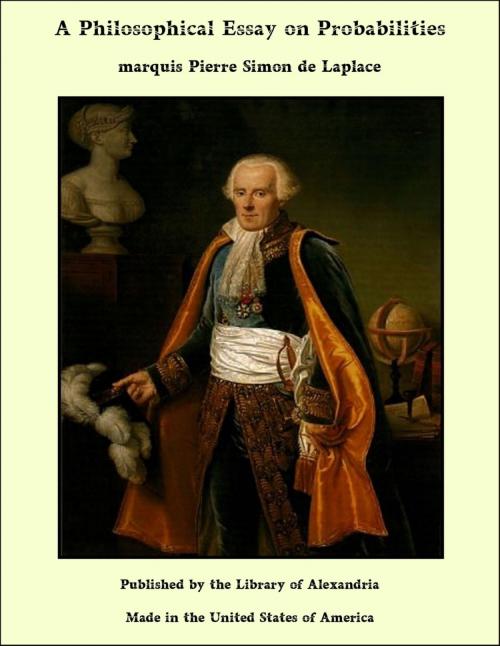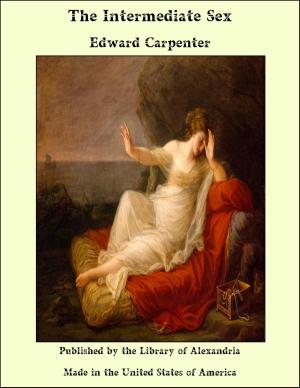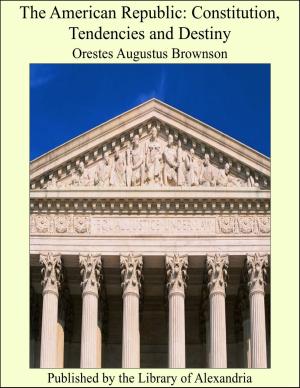A Philosophical Essay on Probabilities
Nonfiction, Religion & Spirituality, New Age, History, Fiction & Literature| Author: | marquis Pierre Simon de Laplace | ISBN: | 9781465625496 |
| Publisher: | Library of Alexandria | Publication: | March 8, 2015 |
| Imprint: | Language: | English |
| Author: | marquis Pierre Simon de Laplace |
| ISBN: | 9781465625496 |
| Publisher: | Library of Alexandria |
| Publication: | March 8, 2015 |
| Imprint: | |
| Language: | English |
This philosophical essay is the development of a lecture on probabilities which I delivered in 1795 to the normal schools whither I had been called, by a decree of the national convention, as professor of mathematics with Lagrange. I have recently published upon the same subject a work entitled The Analytical Theory of Probabilities. I present here without the aid of analysis the principles and general results of this theory, applying them to the most important questions of life, which are indeed for the most part only problems of probability. Strictly speaking it may even be said that nearly all our knowledge is problematical; and in the small number of things which we are able to know with certainty, even in the mathematical sciences themselves, the principal means for ascertaining truth—induction and analogy—are based on probabilities; so that the entire system of human knowledge is connected with the theory set forth in this essay. Doubtless it will be seen here with interest that in considering, even in the eternal principles of reason, justice, and humanity, only the favorable chances which are constantly attached to them, there is a great advantage in following these principles and serious inconvenience in departing from them: their chances, like those favorable to lotteries, always end by prevailing in the midst of the vacillations of hazard. I hope that the reflections given in this essay may merit the attention of philosophers and direct it to a subject so worthy of engaging their minds. All events, even those which on account of their insignificance do not seem to follow the great laws of nature, are a result of it just as necessarily as the revolutions of the sun. In ignorance of the ties which unite such events to the entire system of the universe, they have been made to depend upon final causes or upon hazard, according as they occur and are repeated with regularity, or appear without regard to order; but these imaginary causes have gradually receded with the widening bounds of knowledge and disappear entirely before sound philosophy, which sees in them only the expression of our ignorance of the true causes. Present events are connected with preceding ones by a tie based upon the evident principle that a thing cannot occur without a cause which produces it. This axiom, known by the name of the principle of sufficient reason, extends even to actions which are considered indifferent; the freest will is unable without a determinative motive to give them birth; if we assume two positions with exactly similar circumstances and find that the will is active in the one and inactive in the other, we say that its choice is an effect without a cause. It is then, says Leibnitz, the blind chance of the Epicureans. The contrary opinion is an illusion of the mind, which, losing sight of the evasive reasons of the choice of the will in indifferent things, believes that choice is determined of itself and without motives. We ought then to regard the present state of the universe as the effect of its anterior state and as the cause of the one which is to follow. Given for one instant an intelligence which could comprehend all the forces by which nature is animated and the respective situation of the beings who compose it—an intelligence sufficiently vast to submit these data to analysis—it would embrace in the same formula the movements of the greatest bodies of the universe and those of the lightest atom; for it, nothing would be uncertain and the future, as the past, would be present to its eyes. The human mind offers, in the perfection which it has been able to give to astronomy, a feeble idea of this intelligence. Its discoveries in mechanics and geometry, added to that of universal gravity, have enabled it to comprehend in the same analytical expressions the past and future states of the system of the world.
This philosophical essay is the development of a lecture on probabilities which I delivered in 1795 to the normal schools whither I had been called, by a decree of the national convention, as professor of mathematics with Lagrange. I have recently published upon the same subject a work entitled The Analytical Theory of Probabilities. I present here without the aid of analysis the principles and general results of this theory, applying them to the most important questions of life, which are indeed for the most part only problems of probability. Strictly speaking it may even be said that nearly all our knowledge is problematical; and in the small number of things which we are able to know with certainty, even in the mathematical sciences themselves, the principal means for ascertaining truth—induction and analogy—are based on probabilities; so that the entire system of human knowledge is connected with the theory set forth in this essay. Doubtless it will be seen here with interest that in considering, even in the eternal principles of reason, justice, and humanity, only the favorable chances which are constantly attached to them, there is a great advantage in following these principles and serious inconvenience in departing from them: their chances, like those favorable to lotteries, always end by prevailing in the midst of the vacillations of hazard. I hope that the reflections given in this essay may merit the attention of philosophers and direct it to a subject so worthy of engaging their minds. All events, even those which on account of their insignificance do not seem to follow the great laws of nature, are a result of it just as necessarily as the revolutions of the sun. In ignorance of the ties which unite such events to the entire system of the universe, they have been made to depend upon final causes or upon hazard, according as they occur and are repeated with regularity, or appear without regard to order; but these imaginary causes have gradually receded with the widening bounds of knowledge and disappear entirely before sound philosophy, which sees in them only the expression of our ignorance of the true causes. Present events are connected with preceding ones by a tie based upon the evident principle that a thing cannot occur without a cause which produces it. This axiom, known by the name of the principle of sufficient reason, extends even to actions which are considered indifferent; the freest will is unable without a determinative motive to give them birth; if we assume two positions with exactly similar circumstances and find that the will is active in the one and inactive in the other, we say that its choice is an effect without a cause. It is then, says Leibnitz, the blind chance of the Epicureans. The contrary opinion is an illusion of the mind, which, losing sight of the evasive reasons of the choice of the will in indifferent things, believes that choice is determined of itself and without motives. We ought then to regard the present state of the universe as the effect of its anterior state and as the cause of the one which is to follow. Given for one instant an intelligence which could comprehend all the forces by which nature is animated and the respective situation of the beings who compose it—an intelligence sufficiently vast to submit these data to analysis—it would embrace in the same formula the movements of the greatest bodies of the universe and those of the lightest atom; for it, nothing would be uncertain and the future, as the past, would be present to its eyes. The human mind offers, in the perfection which it has been able to give to astronomy, a feeble idea of this intelligence. Its discoveries in mechanics and geometry, added to that of universal gravity, have enabled it to comprehend in the same analytical expressions the past and future states of the system of the world.















